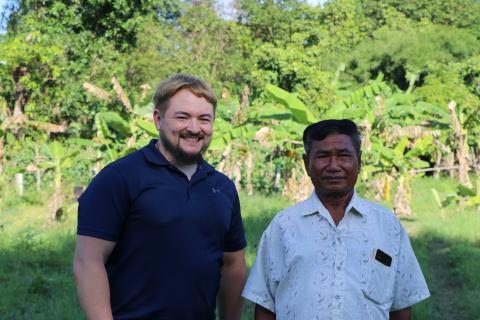
Doctoral Student Works with Survivors of the Khmer Rouge Regime in Cambodia

PAU PhD student, Colin Simsarian, was inspired to research courage and resilience after completing a summer academic fellowship in Phnom Penh, the capital city of Cambodia. Simsarian worked at the Documentation Center of Cambodia for six and a half weeks in their "Truth and Healing Program." There, he interviewed and conducted comprehensive public health forums for survivors of the abuses perpetrated by the Khmer Rouge regime in the 1970s.
From 1975 to 1979, the Khmer Rouge regime (the Communist Party of Kampuchea) killed more than two million people (roughly one-third of the population) in several sites across Cambodia, later named “the killing fields”. In 1979, Vietnam toppled the Khmer Rouge regime, ending the genocide, however, the survivors of this abuse (now mostly in their 60s and 70s) still experience trauma.
Simsarian worked one-on-one with these survivors, teaching them about mental health and coping mechanisms to manage symptoms of their trauma. He also co-developed a public health guidebook to help them improve their mental and physical health. Although Simsarian taught the survivors psychological techniques to heal their trauma, he discovered that simply listening to their stories was what they needed the most.
“Every survivor I talked to had a story,” says Simsarian. “It was tough for them to reveal at first, but after the emotions poured out, I could see that sharing their stories helped them process their emotions. They just needed someone to care and really listen. They also wanted the younger generation to learn from what they had experienced so that it never happens again.”
Simsarian is in his second year as a PhD student in Clinical Psychology and this fellowship has had a major impact on his early career. Before coming to PAU, he spent eight years in the military and served in Afghanistan. This is where his interest in the motivation behind violent behavior began, as well as humanitarian issues and global mental health. This fellowship furthered his interest and helped him clarify a new path for research.
“Two things I’d like to research are courage and resilience,” says Simsarian. “After listening to these survivors’ stories, I’m now better able to investigate what makes someone courageous and resilient, even in the face of immense adversity.”
This past week, Simsarian started his practicum hours at the Gronowski Clinic and believes that his fellowship was instrumental in his training to become an effective and culturally sensitive therapist. “The fellowship gave me a broader perspective of the world,” says Simsarian. “I’ve learned the importance of really listening to a client and asking clarifying questions so that I truly understand what they are saying. And now, I am grateful that I have the opportunity to apply these learnings with my clients at Gronowski.”
Although this fellowship has improved his skills as a future therapist, the most significant impact of this experience was on a personal level. Simsarian was profoundly moved by the resilience of the survivors and is dedicated to building his clients’ resilience in his future practice.
“The biggest takeaway I got from my experience in Cambodia was how tremendous their resilience was. The fact that many of them could still smile and enjoy life after such a horrific occurrence showed their courage and their ability to bounce back from trauma,” says Simsarian. “The experience developed me as a person, and I think I learned quite a bit. And, listening to them share their stories … it was a real privilege to witness.”
